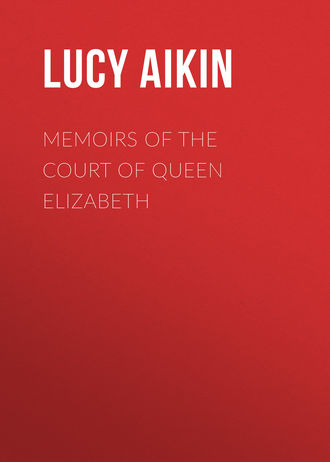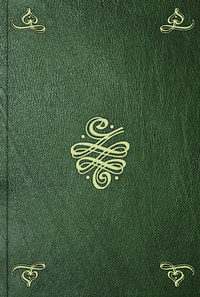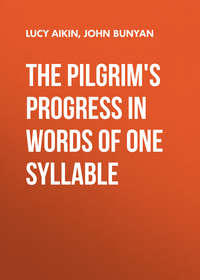 полная версия
полная версияMemoirs of the Court of Queen Elizabeth
This last plan, which best accorded with her disposition, was that adopted by Elizabeth. It may be mentioned as a characteristic trait, that a few years before, she had accepted with thanks an offer secretly made to herself by some person holding an inferior station in the customs, of a full disclosure of the im positions practised upon her in that department. She had admitted this voluntary informer several times to her presence; had imposed silence in the tone of a mistress on the remonstrances of Leicester, Burleigh, and Walsingham, who indignantly urged that he was not of a rank to be thus countenanced in accusation of his superiors; and had reaped the reward of this judicious patronage, by finding herself entitled to demand from her farmer of the customs an annual rent of forty-two thousand pounds, instead of the twelve thousand pounds which he had formerly paid. She now exacted from him a further advance of eight thousand pounds per annum; and stimulated Burleigh to such a rigid superintendence of all the details of public œconomy as produced a very important general result. It was probably in the ensuing parliament that a conference being held between the two houses respecting a bill for making the patrimonial estates of accountants liable for their arrears to the queen, and the commons desiring that it might not be retrospective, the lord treasurer pithily said; "My lords, if you had lost your purse by the way, would you look back or forwards to find it? The queen hath lost her purse."
This rigid parsimony, at once the virtue and the foible of Elizabeth, was attended accordingly with its good and its evil. It endeared her to the people, whom it protected from the imposition of new and oppressive taxes; but, being united in the complex character of this remarkable woman with an extraordinary taste for magnificence in all that related to her personal appearance, it betrayed her into a thousand meannesses, which, in spite of all the arts of graciousness in which she was an adept, served to alienate the affections of such as more nearly approached her. Her nobles found themselves heavily burthened by the long and frequent visits which she paid them at their country-seats, attended always by an enormous retinue; as well as by the contributions to her jewelry and wardrobe which custom required of them under the name of new year's gifts, and on all occasions when they had favors, or even justice, to ask at her hands105. There were few of the inferior suitors and court-attendants composing the crowd by which she had a vanity in seeing herself constantly surrounded, who did not find cause bitterly to rue the day when first her hollow smiles and flattering speeches seduced them to long years of irksome, servile, and often profitless assiduity.
Bacon in his Apophthegms relates on this subject the following anecdote.
"Queen Elizabeth, seeing sir Edward– in her garden, looked out at her window and asked him, in Italian, 'What does a man think of when he thinks of nothing?' Sir Edward, who had not had the effect of some of the queen's grants so soon as he had hoped and desired, paused a little, and then made answer; 'Madam, he thinks of a woman's promise.' The queen shrunk in her head, but was heard to say; 'Well, sir Edward, I must not confute you: Anger makes dull men witty, but it keeps them poor.'"
"Queen Elizabeth," says the same author, "was dilatory enough in suits of her own nature; and the lord treasurer Burleigh, being a wise man, and willing therein to feed her humor, would say to her; 'Madam, you do well to let suitors stay; for I shall tell you, Bis dat qui cito dat; if you grant them speedily, they will come again the sooner.'"
It is probable that the popular story of this minister's intercepting the very moderate bounty which her majesty had proposed to herself the honor of bestowing on Spenser, is untrue with respect to this great poet; since the four lines relating to the circumstance,
"Madam,You bid your treasurer on a timeTo give me reason for my rhime,But from that time and that seasonI have had nor rhyme nor reason,"long attributed to Spenser, are now known to be Churchyard's. Yet that the author of the Faery Queen had similar injuries to endure, is manifest from those lines of unrivalled energy in which the poet, from the bitterness of his soul, describes the miseries of a profitless court-attendance. Few readers will have forgotten a passage so celebrated; but it will here be read with peculiar interest, as illustrative of the character of Elizabeth and the sufferings of her unfortunate courtiers.
"Full little knowest thou that hast not triedWhat hell it is in suing long to bide;To lose good days that might be better spent;To waste long nights in pensive discontent;To speed today, to be put back tomorrow;To feed on hope, to pine with fear and sorrow;To have thy prince's grace, yet want her peers;To have thy asking, yet wait many years;To fret thy soul with crosses and with cares;To eat thy heart through comfortless despairs;To fawn, to crouch, to wait, to ride, to run;To spend, to give, to want, to be undone."Mother Hubbard's Tale.One of the most laudable objects of the parsimony exercised by Elizabeth at this period was that of enabling herself to afford effectual aid to Henry IV. of France, now struggling, with adverse fortune but invincible resolution, to conquer from the united armies of Spain and the League the throne which was his birthright. In the depth of his distress, just when his Swiss and German auxiliaries were on the point of disbanding themselves for want of pay, the friendship of Elizabeth came in aid of his necessities with a supply of twenty-two thousand pounds; a sum, trifling as it may seem in modern estimation, which sufficed to rescue Henry from his immediate embarrassment, and which he frankly avowed to be the largest he had ever seen. The generosity of his ally did not stop here; for she speedily equipped a body of four thousand men and sent them to join him at Dieppe under command of the gallant lord Willoughby. By this reinforcement Henry was enabled to march to Paris and possess himself of its suburbs, and subsequently to engage in several other enterprises, in which he gratefully acknowledged the eminent service rendered him by the valor and fidelity of this band of English.
The next year Elizabeth, alarmed at seeing several of the ports of Bretagne opposite to her own shores garrisoned by Spanish troops, whom the Leaguers had called in to their assistance, readily entered into a new treaty with Henry, by virtue of which she sent a fresh supply of three thousand men to assist him in the recovery of this province. Her expenses however were to be repaid by the king after the expulsion of the enemy.
Sir John Norris, the appointed leader of this force, ranked among the most eminent of Elizabeth's captains; and was also possessed of some hereditary claims to her regard, which she did not fail to acknowledge as far as the jealousy of her favorites would give her leave. One of sir John's grandfathers was that Norris who suffered in the cause of Anne Boleyn; the other was lord Williams of Tame, to whom she had herself been indebted for so much respectful attention in the days of her greatest adversity. She had called up his father to the house of peers, as lord Norris of Ricot; and his mother she constantly addressed by a singular term of endearment, "My own Crow." This pair had six sons, of whom sir John was the eldest;—all, it is said, brave men, addicted to arms, and much respected by her majesty. But an unfortunate quarrel with the four sons of sir Francis Knolles, their Oxfordshire neighbour, arising out of a tournament in which the two brotherhoods were opposed to each other, procured to the Norrises the lasting enmity of this family, which, strong both by its relationship to the queen and its close alliance with Leicester, was able to impede their advancement to stations equal to their merits.
Sir John Norris learned the rudiments of military science under the celebrated admiral Coligni, to whom in his early youth he acted as a page; and he enlarged his experience as captain of the English volunteers who in 1578 generously carried the assistance of their swords to the oppressed Netherlanders when they had rushed to arms in the sacred cause of liberty and conscience. This gallant band particularly signalized its valor in the repulse of an assault made by don John of Austria upon the Dutch camp; a hot action in which Norris had three horses shot under him. In 1588 he was a distinguished member of the council of war. The expedition to Portugal in which he commanded has been already related, and its ill-success was certainly imputable to no want of courage or conduct on his part. In the war of Bretagne he gained high praise by a skilful retreat, in which he drew off his small band of English safe and entire amid a host of foes. We shall afterwards hear of him in a high command in Ireland.
Military glory was the darling object of the ambition of Essex; and jealous perhaps of the fame which sir John Norris was acquiring in the French wars, he prevailed upon the queen to grant him the command of a fresh body of troops destined to assist Henry in expelling the Leaguers from Normandy. The new general was deeply mortified at being obliged to remain for some time inactive at Dieppe, while the French king was carrying his arms into another quarter, whither Essex was restrained by the positive commands of his sovereign from following him. At length they formed in concert the siege of Rouen; but when the town was nearly reduced to extremity, an unexpected march of the duke of Parma compelled Henry to desert the enterprise. Elizabeth made it a subject of complaint against her ally, that the English soldiers were always thrust foremost on every occasion of danger; but by themselves this perilous preeminence was claimed as a privilege due to the brilliancy of their valor; and their leader, delighted with the spirit which they displayed, encouraged and rewarded it by distributing among his officers, with a profusion which highly offended his sovereign, the honor of knighthood, bestowed by herself with so much selection and reserve. Essex supported his character for personal courage, and indulged his impetuous temper, by sending an idle challenge to the governor of Rouen, who seems to have known his duty too well to accept it; but his sanguine anticipations of some distinguished success were baffled by a want of correspondence between the plans of Henry and the commands of Elizabeth; perhaps also in some degree by his own deficiency in the skill of a general. He had the further grief to lose by a musket-shot his only brother Walter Devereux, a young man of great hopes to whom he was fondly attached; and leaving his men before Rouen, under the conduct of sir Roger Williams, a brave soldier, he returned with little glory in the beginning of 1592 to soothe the displeasure of the queen and combat the malicious suggestions of his enemies. In this bloodless warfare better success awaited him. His partial mistress received with favor his excuses; and not only restored him to her wonted grace, but soon after testified her opinion of his abilities by granting him admission into the privy-council.
The royal progress of this year in Sussex and Hampshire affords some circumstances worthy of mention. Viscount Montacute, (now written Montagu,) a nobleman in much esteem with Elizabeth, though a zealous catholic, solicited the honor of entertaining her at his seat of Coudray near Midhurst; a mansion splendid enough to attract the curiosity and admiration of a royal visitant. The manor of Midhurst, in which Coudray is situated, had belonged during several ages to a branch of the potent family of Bohun; thence it passed into possession of the Nevils, a race second to none in England in the antiquity of its nobility and the splendor of its alliances. It thus became a part of the vast inheritance of Margaret countess of Salisbury, daughter of George duke of Clarence. Coudray-house was the principal residence of this illustrious and injured lady, and it was here that the discovery took place of those papal bulls and emblematical banners which afforded a pretext to malice and rapacity to arm themselves against the miserable remnant of her days.
By the attainder of the countess, this with the rest of her estates became forfeited to the crown; but the tyrant Henry was prevailed upon to regrant it, in exchange for other lands, to the heirs of her great-uncle John Nevil marquis Montagu. From an heir female of this branch viscount Montagu, son of sir Anthony Brown master of the horse to Henry VIII., derived it and his title, conferred by queen Mary. But to the ancient mansion there had previously been substituted by his half-brother the earl of Southampton, a costly structure decorated internally with that profusion of homely art which displayed the wealth and satisfied the taste of a courtier of Henry VIII. The building was as usual quadrangular, with a great gate flanked by two towers in the centre of the principal front. At the upper end of the hall stood a buck, as large as life, carved in brown wood, bearing on his shoulder the shield of England and under it that of Brown with, many quarterings: ten other bucks, in various attitudes and of the size of life, were planted at intervals. There was a parlour more elegantly adorned with the works of Holbein and his scholars;—a chapel richly furnished;—a long gallery painted with the twelve apostles;—and a corresponding one hung with family pictures and with various old paintings on subjects religious and military, brought from Battle Abbey, the spoils of which had been assigned to sir Anthony Brown as that share of the general plunder of the monasteries to which his long and faithful service had entitled him from the bounty of his master.
Amongst other particulars of the visit of her majesty at Coudray, we are told that on the morning after her arrival she rode in the park, where "a delicate bower" was prepared, and a nymph with a sweet song delivered her a cross-bow to shoot at the deer, of which she killed three or four and the countess of Kildare one:—it may be added, that this was a kind of amusement not unfrequently shared by the ladies of that age; an additional trait of the barbarity of manners.
Viscount Montagu died two years after this visit, and, to complete his story, lies buried in Midhurst church under a splendid monument of many-colored marbles, on which may still be seen a figure representing him kneeling before an altar, in fine gilt armour, with a cloak and "beard of formal cut." Beneath are placed recumbent effigies of his two wives dressed in rich cloaks and ruffs, with chained unicorns at their feet, and the whole is surrounded with sculptured scutcheons laboriously executed with innumerable quarterings.
At Elvetham in Hampshire the queen was sumptuously entertained during a visit of four days by the earl of Hertford. This nobleman was reputed to be master of more ready money than any other person in the kingdom; and though the cruel imprisonment of nine years, by which Elizabeth had doomed him to expiate the offence of a clandestine union with the blood-royal, could scarcely have been obliterated from his indignant memory, certain considerations respecting the interests of his children might probably render him not unwilling to gratify her by a splendid act of homage, though peculiar circumstances increased beyond measure the expense and inconvenience of her present visit. Elvetham, which was little more than a hunting-seat, was far from possessing sufficient accommodation for the court, and the earl was obliged to supply its deficiencies by very extensive erections of timber, fitted up and furnished with all the elegance that circumstances would permit. He likewise found it necessary to cause a large pond to be dug, in which were formed three islands, artificially constructed in the likeness of a fort, a ship, and a mount, for the exhibition of fireworks and other splendid pageantries. The water was made to swarm with swimming and wading sea-gods, who blew trumpets instead of shells, and recited verses in praise of her majesty: finally, a tremendous battle was enacted between the Tritons of the pond and certain sylvan deities of the park, which was long and valiantly disputed, with darts on one side and large squirts on the other, and suddenly terminated, to the delight of all beholders, by the seizure and submersion of old Sylvanus himself.
Elizabeth quitted Elvetham so highly gratified by the attentions of the noble owner, that she made him a voluntary promise of her special favor and protection;
but we shall find hereafter, that her long-enduring displeasure against him relative to his first marriage was not yet so entirely laid aside but that a slight pretext was sufficient to bring it once more into malignant activity.
Early in the same summer the queen had also paid a visit to lord Burleigh at his favorite seat in Hertfordshire, of which sir Thomas Wylks thus speaks in a letter to sir Robert Sidney:
"I suppose you have heard of her majesty's great entertainment at Theobalds', of her knighting Mr. Robert Cecil, and of the expectation of his advancement to the secretaryship; but so it is as we say in court, that the knighthood must serve for both106."
Sir Christopher Hatton died in the latter end of the year 1591. It appears that he had been languishing for a considerable time under a mortal disease; yet the vulgar appetite for the wonderful and the tragical occasioned it to be reported that he died of a broken heart, in consequence of her majesty's having demanded of him, with a rigor which he had not anticipated, the payment of certain moneys received by him for tenths and first fruits: it was added, that struck with compunction on learning to what extremity her severity had reduced him, her majesty had paid him several visits, and endeavoured by her gracious and soothing speeches to revive his failing spirits;—but that the blow was struck, and her repentance came too late. It is indeed certain that the queen manifested great interest in the fate of her chancellor, and paid him during his last illness very extraordinary personal attentions:—but it ought to be mentioned, in refutation of the former part of the story, that she remitted to his nephew and heir, who was married to a grand-daughter of Burleigh's, all her claims on the property which he left behind him.
During his lifetime, also, Hatton seems to have tasted more largely than most of his competitors of the solid fruits of royal favor. Elizabeth persevered in the practice originating in the reigns of her father and brother, of endowing her courtiers out of the spoils of the church. Sometimes, to the public scandal, she would keep a bishopric many years vacant for the sake of appropriating its whole revenues to secular uses and persons; and still more frequently, the presentation to a see was given under the condition, express or implied, that certain manors should be detached from its possessions, or beneficial leases of lands and tenements granted to particular persons. Thus the bishop of Ely was required to make a cession to sir Christopher Hatton of the garden and orchard of Ely-house near Holborn; on the refusal of the prelate to surrender property which he regarded himself as bound in honor and conscience to transmit unimpaired to his successors, Hatton instituted against him a chancery suit; and having at length succeeded in wresting from him the land, made it the site of a splendid house surrounded by gardens, which have been succeeded by the street still bearing his name. He had even sufficient interest with her majesty to cause her to address to the bishop the following violent letter, several times, with some variations, reprinted.
"Proud prelate;
"I understand you are backward in complying with your agreement; but I would have you to know, that I who made you what you are can unmake you; and if you do not forthwith fulfil your engagement, by God I will immediately unfrock you.
"Yours as you demean yourself,"Elizabeth."Sir John Harrington, in his Brief View of the Church of England, accuses the lord-chancellor Hatton of coveting likewise a certain manor attached to the see of Bath and Wells, and of inflaming the queen's indignation against bishop Godwin on account of his second marriage, in order to frighten him into compliance; a manœuvre which in part succeeded, since the bishop was reduced, by way of compromise, to grant him a long lease of another manor somewhat inferior in value.
With all this, Hatton, as we have formerly observed, was distinguished as the patron of the established church against the puritans: but his zeal in its behalf, whether real or affected, was attended by a spirit of moderation then rare and always commendable. He disliked, and sometimes checked, the oppressions exercised against the papists by the rigid enforcement of recent statutes; and he is reported to have held the doctrine, at that time a novel one, that neither fire nor steel ought ever to be employed on a religious account.
The chancellor, besides his other merits and accomplishments, was a cultivator of the drama. In 1568 a tragedy was performed before her majesty, and afterwards published, entitled Tancred and Gismund, or Gismonde of Salerne, the joint performance of five students of the Temple, who appear each to have taken an act; the fourth bears the signature of Hatton. It is also probable that he gave the queen some assistance in similar pursuits, as her translation of a part of the tragedy of Hercules Œutæus, preserved in the Bodleian, is in his handwriting.
But it was never forgotten by others, nor apparently by himself, that he was brought into notice by his dancing; and we learn from a contemporary letter-writer, that even after he had attained the dignity of lord chancellor he laid aside his gown to dance at the wedding of his nephew. The circumstance is pleasantly alluded to by Gray in the description of Stoke-Pogeis house with which his "Long Story" opens.
"In Britain's isle, no matter where,An ancient pile of building stands;The Huntingdons and Hattons thereEmployed the power of fairy handsTo raise the ceiling's fretted height,Each pannel in achievements clothing,Rich windows that exclude the light,And passages that lead to nothing.Full oft within the spacious walls,When he had fifty winters o'er him,My grave lord keeper led the brawls,The seal and maces danced before him.His bushy beard and shoe-strings green,His high-crown'd hat and satin doublet,Moved the stout heart of England's queen,Though pope and Spaniard could not trouble it."As chancellor of Oxford, Hatton was succeeded by lord Buckhurst, to the fresh mortification of Essex, who again advanced pretensions to this honorary office, and was a second time baffled by her majesty's open interference in behalf of his competitor.
The more important post of lord chancellor remained vacant for some months, the seals being put in commission; after which serjeant Pickering was appointed lord keeper,—a person of respectable character, who appears to have performed the duties of his office without taking any conspicuous part in the court factions, or exercising any marked influence over the general administration of affairs.
Towards one person of considerable note in his day, sir John Perrot, some time deputy of Ireland, Hatton is reported to have acted the part of an industrious and contriving enemy; being provoked by the taunts which sir John was continually throwing out against him as one who "had entered the court in a galliard," and further instigated by the complaints, well or ill founded, against the deputy, of some of his particular friends and adherents.
Sir John Perrot derived from a considerable family of that name seated at Haroldstone in Pembrokeshire, his name and large estates; but his features, his figure, his air, and common fame, gave him king Henry VIII. for a father. Nor was his resemblance to this redoubted monarch merely external; his temper was haughty and violent, his behaviour blustering, his language always coarse, and, in the fits of rage to which he was subject, abusive to excess. Yet was he destitute neither of merit nor abilities. As president of Munster, he had rendered great services to her majesty in 1572 by his vigorous conduct against the rebels. As lord deputy of Ireland between the years 1584 and 1588, he had made efforts still more praiseworthy towards the pacification of that unhappy and ill-governed country, by checking as much as possible the oppressions of every kind exercised by the English of the pale against the miserable natives, towards whom his policy was liberal and benevolent. But his attempts at reformation armed against him, as usual, a host of foes, amongst whom was particularly distinguished Loftus archbishop of Dublin, whom he had exasperated by proposing to apply the revenues of St. Patrick's cathedral to the foundation of an university in the capital of Ireland. Forged letters were amongst the means to which the unprincipled malice of his adversaries resorted for his destruction. One of these atrocious fabrications, in which an Irish chieftain was made to complain of excessive injustice on the part of the deputy, was detected by the exertions of the supposed writer, whom Perrot had in reality attached to himself by many benefits; but a second letter, which contained a protection to a catholic priest and made him employ the words our castle of Dublin, our kingdom of Ireland, produced a fatally strong impression on the jealous mind of Elizabeth.





